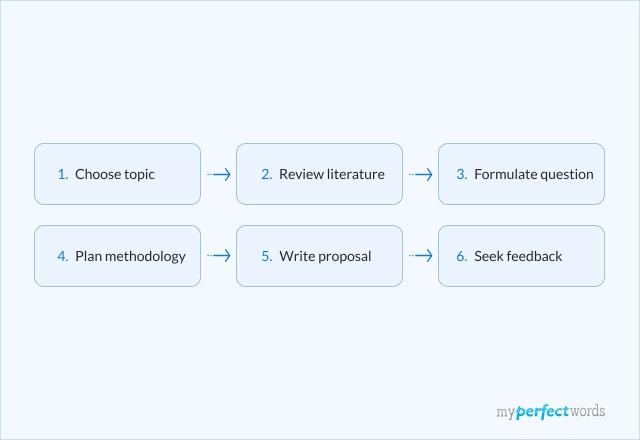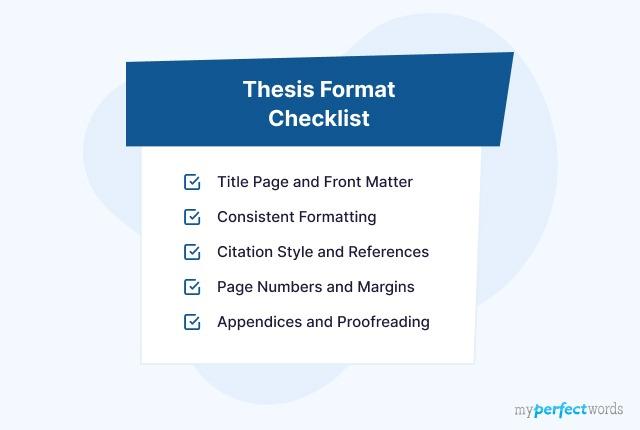Writing a thesis paper is a major milestone in your academic journey.
A thesis is a research paper that allows you to explore a specific topic in-depth, demonstrate your expertise, and contribute to the body of knowledge in your field.
And yes, it is as difficult and challenging as it sounds!
But don’t fret! You can make thesis writing easier and more effective with this complete guide. This guide will take you through the writing process step-by-step, while also addressing everything you need to know for crafting a cohesive research document.
So read on!
On This Page![]()
- 1. What is a Thesis?
- 2. Thesis Writing Format
- 3. How to Start a Thesis Paper?
- 4. Thesis Writing Steps
- 5. Thesis Writing Examples
- 6. Thesis Topics
- 7. Tips for Writing an Improved Thesis
What is a Thesis?
A thesis paper is a well-researched piece of academic writing that presents an original analysis of a specific topic. It is typically required for completion of a master's or doctoral degree.
It is a complex project that requires you to conduct original research, analyze data, and present your findings in a coherent way. It demonstrates a student’s ability to contribute to the advancement of knowledge in their field and prepares them for their future career.
In addition, a thesis is supervised by a committee of experts in the field and has to be defended in an oral examination. Due to its strict academic standards, it is considered one of the most challenging and rewarding academic tasks.
Sometimes, a thesis is also called a dissertation, but are these two really the same? Learn more about their differences in our dissertation vs. thesis blog!
How Long Should a Thesis Be?
The length of a thesis typically varies from project to project. It largely depends on the department, faculties, and fields of study.
The bachelor’s thesis is often 40-60 pages long. However, a master's thesis includes 60–100 pages. On the other hand, a Ph.D. thesis writing must not exceed 80,000 words that makeup almost 100-250 pages.
Remember, these pages contain all the text and referencing list except appendices.
Nevertheless, in thesis writing, students should go for brevity rather than length. The main goal is to come up with the shortest possible paper that contains all the required data. Also, avoid including unnecessary and repetitive information.
Thesis Writing Format
Before we can go into the writing steps for a thesis, you should know about the sections and parts that make up a thesis. Here is the most common thesis format that is used for most major disciplines.
Section 1 - Preliminary Pages
Section 2 - Text Section
Section 3 - References / Bibliography
Section 4 - Appendices
|
How to Start a Thesis Paper?
Thesis writing is a complex process containing several parts. So, you can’t jump right into the writing phase before some prewriting preparations.
Here are the preliminary steps you should take before getting into writing.
Establishing a Framework for Your Thesis
Here are the 5 steps to start a thesis successfully.
- Choose a Thesis Topic
Selecting the right topic is the foundation of your thesis. Follow these steps to make an informed choice.
- Consider your interests and the relevance of the topic to your field, and the availability of resources.
- Talk to your professors or advisors about your topic ideas. They can provide valuable insights and may suggest refinements to your research focus.
- Ensure your chosen topic is feasible within the scope of your academic program, resources, and timeframe.
- Conduct Preliminary Research
Start with a literature review to understand existing research on your topic. Here's what you should do:
- Research credible sources. It may include online journals, periodicals, and books. This will help you identify gaps and formulate your research question.
- Take detailed notes as you review the literature. Record key findings, methodologies, and areas where your research can contribute.
- Develop a Working Thesis
A working thesis is a preliminary statement of your research question or hypothesis. It serves as a guide for your research and may evolve as you gather more data. Here's how to create a working thesis:
- State Your Research Question: Clearly articulate your research question or problem statement. Make it concise and specific.
- Provide a Rationale: Explain why your research question is important and what it aims to achieve in the context of your field.
- Hypothesis (if applicable): If your research involves hypothesis testing, state your hypothesis. This is a testable prediction based on existing knowledge.
- Stay Open to Revision: Remember that your working thesis is not set in stone. It may evolve as you collect and analyze data. Be open to refining it as your research progresses.
- Revisit Guidelines & Instructions
Before you dive deep into your research, revisit any guidelines and instructions provided by your institution or advisor.
Pay attention to formatting requirements, deadlines, and specific expectations for your thesis. These guidelines will help you maintain a structured and organized approach to your work.
- Make an Outline to Structure Your Points
Creating an outline is a fundamental step in organizing your thesis. It provides a roadmap for your research and writing.
Thesis Proposal
Before starting to write a final thesis, the supervisors require the students to submit a well-planned proposal. It provides a detailed summary, outline, and layout of your research work. Moreover, it identifies the problem statement, questions, and methods used to carry out the study.
Follow the given pattern for writing a thesis proposal.
- Introduction
- Literature review
- Theoretical framework
- Research question
- Methodological designs
- References
Thesis Writing Steps
After getting your proposal approved, the actual writing process begins. Here are the major steps and sections you have to cover.
Understanding the Assignment
Before you start writing, ensure you have a clear understanding of your thesis assignment. Review the guidelines provided by your institution, advisor, or department. Pay attention to:
- Word count and formatting requirements.
- Specific research question or problem statement.
- Expectations for literature review and methodology.
- The citation style (e.g., APA, MLA) to be used. h
Thesis Title Page
The title page is the first page of your document that provides essential information such as the title of the thesis, writer’s name, institution, etc.
The formatting of the title page depends on the formatting style you are using. Include the following elements in your title page.

However, remember that the precise information you need to include in the title page is determined by your professor/institution. So, always follow their instructions and formatting guidelines.
Acknowledgments
In the acknowledgments section, you can express gratitude and recognition for individuals or organizations who contributed to your thesis. This may include:
- Advisors and professors who provided guidance and support.
- Peers, colleagues, or friends who assisted in your research.
- Funding sources or institutions that provided financial support.
- Family and loved ones for their encouragement and understanding.
Abstract
The abstract is a concise summary of your entire thesis, typically ranging from 150 to 250 words. Writing a good abstract requires:
- A brief introduction to the research problem.
- A summary of your research methods.
- A concise presentation of your key findings.
- A statement of the broader significance of your study.
Need a comprehensive guide on writing an abstract? Check out our blog on how to write an abstract to learn more.
Thesis Introduction
The introduction of your thesis paper serves as the gateway to your research work. It aims to provide background information about the topic and introduce the main questions or hypothesis.
You should include the following aspects to write an impressive thesis introduction.
- A problem statement
- Background information
- Research questions
- Scope of the study
- Significance of the research
- Structure of the thesis
Literature Review
The literature review section is where you summarize, critique, and synthesize existing research related to your topic.
You should conduct thorough research to review the relevant literature on the topic. When writing the literature review section of your thesis, you should keep the following points in mind:
- Provide a review of the relevant literature.
- Identify gaps or areas where your research can contribute.
- Do a critical analysis of the methodologies used in previous studies.
- Present a well-organized presentation of the literature.
Wondering how to write a literature review? Here’s a detailed guide to writing a literature review to help you out.
Research Methodology
After you’ve introduced your questions and presented a comprehensive literature review, you need to turn towards your own work. The research methodology section presents the methods and techniques that you used to conduct your study.
There are various qualitative and quantitative methods that are used to find answers and test hypotheses. This section aims to clarify these methods to enhance the credibility of your conclusions.
It should include:
- A clear description of the research methods used.
- An explanation of the rationale behind your chosen methods.
- Details on data collection and analysis procedures.
- Addressing any ethical considerations or limitations.
Findings / Results
This section showcases the outcomes of your research. It should present data, facts, and observations clearly and objectively.
Here's how to present your findings in this section:
- Use tables, charts, and figures to display data.
- Report your findings objectively without interpretation.
- Ensure your presentation aligns with the research questions.
Discussion
The Discussion section is a critical part of your thesis where you make sense of the findings presented in the "Results" section.
This is where you delve into the meaning and implications of your research, relate your findings to existing knowledge, and address the broader significance of your study.
Here’s what you need to address in this section:
- Analyze your findings in the context of your research questions.
- Argue for and convince the reader of your interpretation.
- Explain how your results contribute to existing knowledge.
- Address any limitations or potential sources of bias.
Thesis Conclusion
The thesis conclusion section is the closing chapter of your research, and it plays a vital role in tying together all the elements of your thesis.
- Begin by summarizing the most significant findings from your research. Reiterate the main results and their relevance to your research question.
- Restate your thesis statement, which should align with the research question you posed at the beginning of your thesis.
- Discuss the broader significance of your research. How does it relate to the larger context of your field or the world at large?
- Similarly, highlight the practical implications of your research. How can your findings be applied to real-world situations, policy decisions, or practical solutions?
- Finally, suggest specific areas for future research based on your findings.
References
The references section is where you list all the sources, including books, articles, and other materials, that you have referenced in your thesis.
Moreover, this section should be organized according to a specific citation style, such as APA, MLA, or Chicago, as required by your institution or field of study.
Appendices
This section provides readers with easy access to additional information, allowing them to delve deeper into your research. The Appendices section typically includes a variety of materials, the most common of them are:
- List of Tables: This is a list that catalogs all the tables you've included in your thesis.
- List of Figures: Similar to the list of tables, the list of figures provides an inventory of all the figures, charts, graphs, and visual elements included in your thesis.
- List of Abbreviations: If your thesis makes extensive use of abbreviations, acronyms, or initialisms, you can provide a list of these terms and their corresponding full forms or explanations in the appendices.
Thesis Writing Examples
Here is a good thesis example for you to better understand the process of writing a thesis. This thesis is the complete and final output reached after following the step-by-step writing process.
Thesis Topics
Below given are some interesting topic ideas for writing a thesis paper.
- The Impact of Mindfulness-Based Stress Reduction Programs on Anxiety Levels in High School Students.
- Assessing the Efficacy of Sustainable Farming Practices in Mitigating Soil Erosion in Agroecosystems.
- Exploring the Role of Emotional Intelligence in Leadership Effectiveness and Team Performance.
- The Influence of Online Learning Platforms on Student Engagement and Academic Achievement in Higher Education.
- Enhancing Cybersecurity in the Internet of Things (IoT) Ecosystem: Vulnerabilities and Solutions.
- The Socioeconomic and Cultural Impact of the Industrial Revolution on Urban Communities in 19th Century Europe.
- An Investigation into the Long-Term Effects of Childhood Obesity on Cardiovascular Health in Adulthood.
- The Role of Social Media in Shaping Political Opinions and Civic Engagement Among Millennials.
- A Comparative Analysis of the Theme of Identity in the Novels of Toni Morrison and Chimamanda Ngozi Adichie.
- Design and Optimization of Renewable Energy Microgrids for Rural Electrification in Developing Countries.
Need more unique ideas for your thesis? Check out our list of creative thesis topics to help you out!
Tips for Writing an Improved Thesis
Follow the thesis writing tips given below to write a well-researched thesis.
- Plan Your Timeline: Begin your research and writing well in advance. A thesis is a lengthy project, and starting early will give you time to refine your ideas, gather data, and address any unexpected setbacks.
- Maintain a Logical Flow: Ensure that your thesis flows logically from one section to the next. Use clear transitions between ideas, and each section should contribute to the overall argument.
- Quality over Quantity: It's not about how many pages you write but the quality of your content. Avoid unnecessary repetition and aim for concise, well-structured arguments.
- Use a Consistent Style: Adhere to a consistent writing style (e.g., APA, MLA) and formatting guidelines. Consistency in citation and formatting makes your thesis appear more professional.
- Seek Feedback: Share your work with peers, mentors, or advisors. Constructive feedback from others can help you refine your arguments and enhance your writing.
- Edit and Proofread: Carefully edit and proofread your work for grammar, spelling, and clarity. Consider seeking feedback from peers or advisors to catch errors and improve readability.
- Don't Fear Revision: Expect to revise and rewrite extensively. Few people get everything perfect on the first try. Revision is an essential part of the writing process.
- Persevere: Writing a thesis can be challenging, and you may encounter obstacles. Stay resilient and seek support when needed. Take breaks to recharge your mind.
In conclusion,
Writing a thesis is a challenging task that demands dedication, critical thinking, and effective time management. By following the tips outlined in this guide, you can navigate the thesis-writing process with confidence.
Remember that while the path may be filled with revisions, the ultimate goal is to contribute meaningfully to your field. So don’t get overwhelmed and take it step-by-step.
Need professional help with writing your thesis? We’ve got your back!
MyPerfectWords.com is the best essay writer service in the USA. We guarantee high-quality and well-researched thesis for multiple academic levels and subjects.
You can buy a thesis from us at affordable rates. Simply contact our 24/7 customer support and specify your requirements, and we will assign a writer to work on your thesis.
So what are you waiting for? Get help from our thesis writing service today!
Besides, fulfill your do my essay cheap request with our essay writing service. We assure you that you will not regret your decision!

Write Essay Within 60 Seconds!
Use our AI tool to generate high quality essay
WRITTEN BY
Caleb S.
Caleb S. has been providing writing services for over five years and has a Masters degree from Oxford University. He is an expert in his craft and takes great pride in helping students achieve their academic goals. Caleb is a dedicated professional who always puts his clients first.




